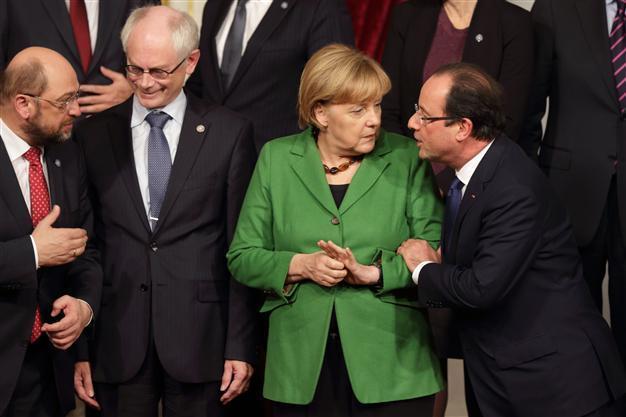EU set to challenge Germany over export policy
BRUSSELS - Agence France-Presse

French President Francois Hollande (R), German Chancellor Angela Merkel (2ndR), European Council President Herman Van Rompuy (2ndL) and European Parliament President Martin Schulz arrive for a family photo during an international summit on youth unemployment attended by heads of states from EU countries at the Elysee Palace in Paris, November 12, 2013. REUTERS photo
In an unprecedented step, the European Commission is expected on Wednesday to take powerhouse Germany to task over its reliance on exports for growth to the disadvantage of its weaker EU partners.The head of the European Union executive, Jose Manuel Barroso, is due at an earlier-than-expected 1200 GMT to announce the findings of a report on the economic progress of all 28 members, with up to 16, including Germany, expected to fall short in one way or another.
Based on a scoreboard of indicators as part of an Annual Growth Survey, Brussels aims to identify possible economic imbalances, ranging from public deficits to trade surpluses which if left unchecked, could ultimately harm overall growth.
Thirteen countries were put on the blacklist last year, among them Belgium, Britain, Bulgaria, Denmark, Finland, France, Hungary, Italy, Malta, The Netherlands and Sweden for offences deemed notifiable but not requiring urgent attention.
Two others, Spain and Slovenia, were considered to be suffering from a combination of imbalances considered excessive which had to be tackled.
"My guess is that the 13 from last year will again need In-Depth Reviews (extra scrutiny), with another one, two or three on top," said a Commission official who asked not to be named.
Alongside Germany,France's slide away from agreed deficit targets puts it in focus with the possibility of a harsher finding to follow.
The eurozone's two biggest economies "hold the key" to growth and succes in Europe, Economic Affairs and Euro Commissioner Olli Rehn said last week.
They would "do a great service to the eurozone if they were to follow (Commission) recommendations," he said.
A rap over the knuckles for Germany would come at a sensitive time, however, with German Chancellor Angela Merkel embroiled in difficult talks on forming a coalition government with her Social Democratic opponents.
In addition, Germany came under strong fire from various quarters at the height of the eurozone debt crisis, being criticised notably by countries in trouble for demanding too much austerity in return for its financial help, and for not importing enough. Germany's massive export machine has delivered steady growth over the years to the envy of many of its EU partners and Berlin has consistently rejected criticism -- from Rehn, Washington -- over its economic policy.
On Wednesday, the German Council of Economic Experts took up the cudgels again.
"Future challenges will be far more difficult to overcome if [longstanding domestic] reforms become diluted or reversed in some cases," they warned.
"The same holds for measures which hurt growth and job creation, such as minimum wages and tax increases." The German trade surplus hit another record at 18.9 billion euros in September and ran above 6.0 percent of gross domestic product -- the EU's recommended ceiling -- from 2007 to 2011.
Rehn wants Germany to liberate wage policies and so remove "bottlenecks to domestic demand." If Germany boosts consumption and imports more, that would increase exports from other EU countries, helping them to find growth and desperately needed jobs.
The aim of Wednesday's Annual Growth Survey and the Alert Mechanism Report is to help coordinate economic policy to deliver growth and jobs.
Essential to that task is to get misfiring France pulling together with Germany and for that to happen, Paris needs to bite the bullet on painful economic reforms.
If Paris reforms "its labour market, business environment and pension system to support competitiveness, they will together do a great service to the entire eurozone -- providing stronger growth, creating more jobs and reducing social tensions," Rehn said earlier this week.
















